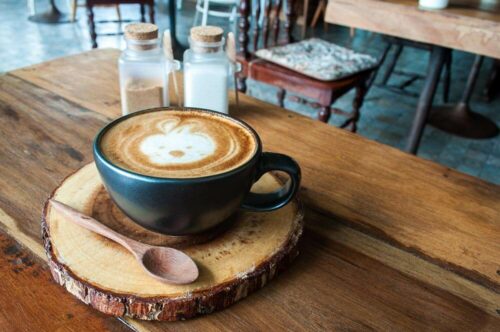
Five months ago, I started to reduce the number of caffeinated drinks I consumed each day. Three months ago, I completely quit caffeine to see how my sleep and daily life would be affected.
Being mindful of your caffeine intake is one of the most commonly listed self-help tips for better sleep. Show me a sleep hygiene article that doesn’t mention it, and I’ll show you a pillow stuffed with golden unicorn feathers.
As a sleep blogger who also recommends thinking about caffeine consumption, I wanted to put my money where my mouth is and see if giving up my daily buckets of coffee would really improve my sleep.
The short answer is that I feel like I’ve been sleeping better, and my sleep tracker has also shown some modest improvement to the total sleep time and sleep score. I also feel better during the daytime, with less anxiety and an overall improvement in my mood.
However, I don’t think quitting caffeine is the last step I’ll need to take if I want to consistently sleep better, and I’ll probably need to consider other factors as well.
Recap: Nine months of experimenting with my sleep
This past year has felt at times like an epic journey towards an increasingly extreme form of abstinence. No drugs, no alcohol, no nicotine, no caffeine, no added sugar or artificial sweeteners.
Nine months after I began the first part of my personal experiment, I finally know what it feels like to live a straight edge lifestyle, and importantly for this blog: how I sleep without eating or drinking all the fun stuff.
In this article, I’ll be focussing on how quitting caffeine affected my sleep tracker data, and my observations of how I’ve been sleeping. I’ll also compare the time without caffeine with the data I have from the preceding year and a half.
In some ways, this is the third in a series, but it’s a standalone piece that doesn’t require a reading of the previous two to understand.
If you’re interested though, you might like to read part one in which I gave up alcohol and sugar for a month. And then there’s part two, in which I discuss four months without consuming them.
Just my experience
My intention is to discuss my personal experience of quitting caffeine and other substances, and is not intended to be medical or dietary advice. I’m not a doctor or nutritionist, so if you have any concerns about your diet or health, please discuss them with your doctor or a qualified nutritionist.
I’ll also do my best to resist the siren’s call of self-righteousness. I think it can be helpful to hear about other people’s experiences if you’re considering giving something up but aren’t quite ready yet. It’s perhaps less helpful when someone overzealously tries to convince you that “This way is better!”
And honestly, I’m still not entirely convinced my black or white abstinence is ‘better’ anyway.
Why I gave up caffeine and what I hoped to gain
Giving up alcohol and sugar nine months ago now has definitely been good for me, and in many ways. However, my sleep tracker data hasn’t shown the kind of vast improvement in my sleep that I’d expected.
My personal feeling is that I sleep better without alcohol or an uncomfortable belly after eating too much chocolate late in the evening. But my wearable sleep tracker data just hasn’t backed that up in a way that was clear (I use the Fitbit Versa 3).
So I decided to search elsewhere for sleep-stealing culprits. And caffeine was the obvious target, especially considering how much I typically consumed.
I averaged two to four cups of strong coffee most mornings, maybe another one in the afternoon, and probably a couple of black teas as well during the afternoon. Add my love of chocolate to that, and my daily caffeine consumption was quite high.
Caffeine is a stimulant, and research has shown that it can have important disruptive effects on sleep. For example, a study in 2006 found that high caffeine intake led to worse sleep in adolescents, and a study in 2013 found that caffeine intake in the six hours before going to bed led to more disrupted sleep in adults.
Interestingly, I’ve long wondered whether I’ve been stuck in a vicious circle of needing caffeine to wake me up because I’m sleep deprived, when one of the things that caused the sleep deprivation in the first place may have been caffeine the day before!
There was a fascinating review of the link between caffeine, sleep quality and daytime functioning published by Australian researchers in 2018 that’s worth reading if that concept interests you.
To find out if my coffee habit was robbing me of sleep, I decided to cut down slowly and then switch to decaf. If nothing else, it was going to be interesting to see what I’m like as a person with no caffeine in my system. After all, by my calculations, I’ve been drinking it daily in one form or another for 27 years!
Step one: No caffeine after midday
On August 9, 2021, I started the reduction in my daily caffeine consumption. My aim was to drink no coffee or tea after midday, which naturally resulted in me cutting down to between one and three cups most mornings as I just didn’t feel like drinking more than that.
By October, I was down to just one cup most mornings as that seemed enough to wake me up and get on with the day. After that, I just drank decaf and was perfectly happy with it.
Let’s take a look at my Fitbit Versa 3 data for the period of moderating only.
1. Total sleep time
The table below shows the average sleep I got per night from August 9 – October 26.
| Dates | Average sleep per night |
| Aug 9 – Aug 15 | 6 hrs 47 mins |
| Aug 16 – Aug 22 | 6 hrs 47 mins |
| Aug 23 – Aug 29 | 7 hrs 13 mins |
| Aug 30 – Sep 5 | 6 hrs 54 mins |
| Sep 6 – Sep 12 | 6 hrs 56 mins |
| Sep 13 – Sep 18 | 6 hrs 43 mins |
| Sep 20 – Sep 26 | 6 hrs 55mins |
| Sep 27 – Oct 3 | 6 hrs 27 mins |
| Oct 4 – Oct 10 | 6 hrs 58 mins |
| Oct 11 – Oct 17 | 7 hrs 2 mins |
| Oct 18 – Oct 24 | 6 hrs 48 mins |
| Average | 6 hrs 52 mins |
So the average amount of sleep I got during the two and a half months moderating phase was 6 hours and 52 minutes. This is a reasonable amount for me, but how does it compare to the previous phases of my experiment?
- The year before quitting anything: 6 hrs 52 mins
- Month 1 with no sugar or alcohol: 6 hrs 44 mins
- Months 2-4 with no sugar or alcohol: 6 hrs 53 mins
- Months 5-6 with no caffeine after midday: 6 hrs 52 mins
You can see that the total sleep time shows no improvement at all, and is the same as it was during the year before I started my experiment.
I’m starting to wonder whether I’ll always average just under seven hours of sleep, no matter what I do. Perhaps that’s all the sleep I need and I shouldn’t be concerned?
2. Fitbit sleep score
In the table below, you can see the Fitbit sleep score during the moderating phase.
| Dates | Fitbit Sleep Score |
| Aug 9 – Aug 15 | 81 |
| Aug 16 – Aug 22 | 82 |
| Aug 23 – Aug 29 | 80 |
| Aug 30 – Sep 5 | 81 |
| Sep 6 – Sep 12 | 82 |
| Sep 13 – Sep 18 | 82 |
| Sep 20 – Sep 26 | 81 |
| Sep 27 – Oct 3 | 77 |
| Oct 4 – Oct 10 | 82 |
| Oct 11 – Oct 17 | 80 |
| Oct 18 – Oct 24 | 82 |
| Average | 81 |
And once again, let’s compare that to the previous stages of my experiment:
- The year before quitting anything: 81
- Month 1 with no sugar or alcohol: 82
- Months 2-4 with no sugar or alcohol: 81
- Months 5-6 with no caffeine after midday: 81
Just like with the total sleep time, there’s no change. The sleep score is actually remarkably stable for the entire year and a half.
3. Restless time
I decided not to look at the sleep stage data in depth after the last article because, on reflection, I just don’t know if I can trust it enough to warrant including it. At least with the total sleep time, and the score, I can kind of compare it with my manual sleep diary and feeling of how well I slept.
One other measuring point which I have managed to ‘roughly’ double-check based on how soundly I feel I sleep is total restless time.
I’m not including a table this time, as the Fitbit app doesn’t give you weekly averages. Instead, I manually calculated the average. Here it is compared to the preceding time periods. I didn’t include the entire year before, because it takes too long to manually extract the data from the app.
- 2 weeks before quitting sugar and alcohol: 7.9%
- Month 1 with no sugar or alcohol: 7.1%
- Months 2-4 with no sugar or alcohol: 8.4%
- Months 5-6 with no caffeine after midday: 9.2%
Seeing my total restless time going up to 9.2% surprised me. I’m not sure what the explanation could be. So far, my best guesses are a change in the firmware of the Fitbit, or something else making me more restless that has nothing to do with my diet. There was a month of more stress than usual in there, so perhaps that had an impact.
4. Resting heart rate
The final point I’ve been keeping track of throughout the experiment is my resting heart rate. Again, it’s too time consuming to pull a year’s data out of the app, so I’ve only included the two weeks before I started giving things up, and was eating and drinking whatever I liked.
- 2 weeks before quitting sugar and alcohol: 60
- Month 1 with no sugar or alcohol: 57.8
- Months 2-4 with no sugar or alcohol: 55.8
- Months 5-6 with no caffeine after midday: 56
There’s nothing in this result that suggests moderating caffeine had much effect on my resting heart rate beyond the improvement that already came from quitting alcohol and sugar.
It’s good to see it’s still lower than the year before, so I imagine that the reduction in alcohol, healthier diet, and increase in exercise continue to benefit me.
5. How I felt while moderating caffeine
I don’t feel like keeping the coffee to the morning had much impact on my sleep, so the sleep tracker data seems reasonable – even if I secretly wish there was an improvement to my sleep!
I felt better during the daytime, with slightly less nervous energy in the afternoon. But nothing of note where my sleep is concerned. Perhaps I was still managing to drink enough in the morning that the benefits of reducing it weren’t noticeable. The next section will provide some more insight on that front.
Step 2: Zero caffeine
This step was hard! Even though the cut was only from one coffee a day to none, I still had headaches, lethargy, and low mood for several days.
I think either I’m particularly sensitive to caffeine, or I’ve found the secret to making the world’s strongest coffee! Maybe when they say steep for 2 minutes, adding an extra 0 isn’t such a good idea after all…
Let’s see what happened to my sleep with no caffeine at all in my system.
1. Total sleep time
In the table below, you can see my average sleep time from October 26, 2021 to January 8, 2022:
| Dates | Average sleep per night |
|---|---|
| Oct 26 – Oct 30 | 7 hrs 0 mins |
| Nov 1 – Nov 7 | 6 hrs 59 mins |
| Nov 8 – Nov 14 | 6 hrs 58 mins |
| Nov 15 – Nov 21 | 6 hrs 53 mins |
| Nov 22 – Nov 28 | 7 hrs 18 mins |
| Nov 30 – Dec 5 | 6 hrs 47 mins |
| Dec 6 – Dec 12 | 6 hrs 35 mins |
| Dec 13 – Dec 18 | 6 hrs 51 mins |
| Dec 20 – Dec 26 | 7 hrs 15 mins |
| Dec 27 – Jan 2 | 6 hrs 58 mins |
| Jan 3 – Jan 8 | 6 hrs 52 mins |
| Average | 6 hrs 57 mins |
On average then, I got 6 hours and 57 minutes of nightly sleep with no caffeine. Let’s compare it to the previous time periods again:
- The year before quitting anything: 6 hrs 52 mins
- Month 1 with no sugar or alcohol: 6 hrs 44 mins
- Months 2-4 with no sugar or alcohol: 6 hrs 53 mins
- Months 5-6 with no caffeine after midday: 6 hrs 52 mins
- Months 7-8 with zero caffeine: 6 hrs 57 minutes
It’s the most average sleep so far since I started the experiment, but still only five minutes more than the year when I ate and drank whatever I felt like.
I was surprised it wasn’t more time, as I do feel like I’ve been sleeping better with no caffeine in my system on the whole. More on that later.
2. Fitbit sleep score
Below are my Fitbit sleep scores for the time with zero caffeine:
| Dates | Fitbit Sleep Score |
|---|---|
| Oct 26 – Oct 30 | 85 |
| Nov 1 – Nov 7 | 81 |
| Nov 8 – Nov 14 | 84 |
| Nov 15 – Nov 21 | 84 |
| Nov 22 – Nov 28 | 84 |
| Nov 30 – Dec 5 | 83 |
| Dec 6 – Dec 12 | 84 |
| Dec 13 – Dec 18 | 82 |
| Dec 20 – Dec 26 | 82 |
| Dec 27 – Jan 2 | 82 |
| Jan 3 – Jan 8 | 82 |
| Average | 83 |
Finally, there’s a result of note. The average of 83 is the highest so far, and even though it’s not a huge leap, it’s still an improvement. Below you can see the sleep scores for the whole time period again:
- The year before quitting anything: 81
- Month 1 with no sugar or alcohol: 82
- Months 2-4 with no sugar or alcohol: 81
- Months 5-6 with no caffeine after midday: 81
- Months 7-8 with zero caffeine: 83
One interesting point is that this is the first time period since I began the experiment in which there was no week with a score below 80.
So even though the overall average might not seem significantly higher than before, the consistency of those 80+ scores is satisfying to see. Perhaps that helps explain why I feel like I’ve been sleeping well these past couple of months.
Nights with 90 sleep score
In addition to the consistent sleep scores of 80+, there were three days in the zero caffeine period when the sleep scores were 90, 90, and 91.
Considering this was just a 2.5 month period, and there were only five 90+ days in the whole year before quitting alcohol, sugar, or caffeine, it gives me room for optimism that my sleep is heading in the right direction, albeit slower than I had hoped for.
3. Restless time
There’s something happening with the restless time that I can’t explain. 8.8% on average with no caffeine is not what I expected. Below is the comparison again:
- The year before quitting anything: 7.9%
- Month 1 with no sugar or alcohol: 7.1%
- Months 2-4 with no sugar or alcohol: 8.4%
- Months 5-6 with no caffeine after midday: 9.2%
- Months 7-8 with zero caffeine: 8.8%
Although it’s a bit lower than the months with caffeine in moderation, it’s still higher than all the previous time periods. Honestly, I have no explanation for this increase. I plan to continue without caffeine, so this is one sleep measure I’ll be keeping a keen eye on.
4. Resting heart rate
In the previous article, I talked about how pleased I was to see a large improvement in my resting heart rate. The drop was quite noticeable when I gave up alcohol and sugar. Since then, it seems to have leveled off though. Below you can see the change over time:
- The two weeks before quitting anything: 60
- Month 1 with no sugar or alcohol: 57.8
- Months 2-4 with no sugar or alcohol: 55.8
- Months 5-6 with no caffeine after midday: 56
- Months 7-8 with zero caffeine: 55.9
My resting heart rate on average was the same with caffeine in moderation (56) and zero caffeine (55.9). And it’s not really any different from the previous two months when I was still drinking caffeine (55.8).
Interestingly, I took two weeks off work at Christmas, and did a huge amount of exercise on most days. The average for that two weeks was 54, which is lower than all the previous time periods.
So I wonder if my resting heart rate can only really be improved further with exercise? Perhaps my diet is less of a factor simply because it’s so healthy already, there’s not much more that will happen through tweaking the diet alone. That’s a theory I’d have to put to the test in the future I think.
It’s also possible that being so healthy has opened up space in my life for more exercise, and more enjoyment of exercise. I’m currently doing considerably more exercise than I used to, so perhaps I need to view measures like the resting heart rate from multiple angles and not get tunnel vision because of my current interest in diet.
5. How I felt after quitting caffeine
Giving up caffeine seems to have objectively improved my total sleep time and Fitbit sleep score, but not by a huge amount. And at the same time, I appear to be more restless at night, which is somewhat contradictory.
So once again, it’s perhaps more important to consider how I personally feel my sleep was before and after quitting caffeine.
I’ll start with an additional benefit I’ve felt because I think it’s important and relevant: less anxiety. Cutting down caffeine helped a bit, but I noticed a big improvement to my anxiety levels and general stability of mood when I cut it out. And on that note, less trembly hands too when I accidentally overdosed on coffee!
For me, and many people I suspect, anxiety and sleep are not friends. Having an overall reduction in daily anxiety and stress levels has meant going to bed at night with less on my mind, which can only be good. In the last month, I can count on one hand the number of times I’ve been awake in bed late at night ruminating.
Whether the sleep tracker shows it or not, I do feel that quitting caffeine completely had a positive impact on my sleep. I feel like I more regularly get a good night’s sleep without being awake for ages in the night. And there have been many nights recently when I’ve slept very deeply – at least that’s how I feel when I wake up.
Future plans
Continuing without caffeine
I previously wrote about how I’ve struggled at times with abstaining from alcohol and sugar, especially at parties and special events.
With caffeine, it’s the complete opposite; I’m happy not to be drinking it and have zero desire to go back to the dark days of panicking in the morning when you discover there’s no coffee in the cupboard.
This clear and unwavering feeling that life is better without caffeine is very welcome news, as it reduces the amount of mental work I have to put into resisting temptation on a daily basis.
Interestingly, when I gave up alcohol and sugar nine months ago, I felt many positive benefits. With caffeine, it’s been more a case of seeing negatives disappearing instead of benefits appearing. That may seem like two sides of the same coin, but I think it’s an important distinction to make.
To give some clear examples, I had brighter eyes, more energy, better skin, better digestion, and more energy when I quit alcohol and sugar. I felt like these were positive additions that I could really see growing over time.
With caffeine, I have fewer grumpy mornings until I’ve had a coffee, less trembling hands when coffee is too strong, less yucky feeling in the stomach from drinking too many coffees back to back, fewer toilet breaks during the day, and less washing up. These feel more like the removal of negatives rather than the addition of positives.
Anyway, no matter which way you choose to look at it, giving up caffeine has been nothing but good for me, and surprisingly easy to keep up once you push past the first few days of withdrawal.
The late exercise, late stress, and late snacks need to calm down
I’ve noticed in the past that the average sleep times and sleep scores can be heavily affected by just one or two very bad nights’ sleep. So, during the last five months, I’ve kept a diary of what I was doing in the evenings before I slept particularly badly.
As well as trying to improve my sleep in general, I’ve also been thinking about what I can do to reduce the worst outliers: the nights when the sleep score is around 70; the nights when I only get five or six hours of sleep.
Below you can see a screenshot of my Fitbit app sleep data. Notice how the sleep score was high for six days, with three in the high 80s, but the weekly average was pulled down by the worst night of 77:
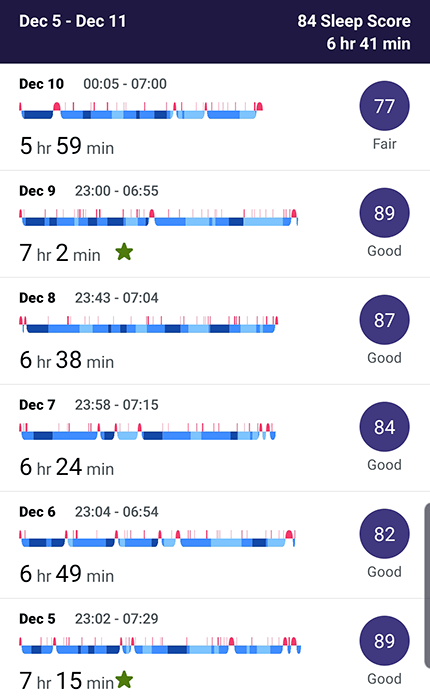
One pattern I’ve seen is that late-night events, like intense exercise, stressful conversations, or snacks while watching a movie often precede a bad night’s sleep.
So going forward, I’m going to try to reduce how energetic my late evenings are whenever possible, both physically and emotionally.
Obviously, I can’t control everything, and have no plans not to have any fun in the evening because it might affect my sleep score! But if there are some decisions I can take that don’t have an impact on my enjoyment of life, I’ll be more mindful.
A good example is not eating a giant bowl of popcorn just before going to bed! Another would be having a lighter workout if it’s getting late rather than going nuts and then just hoping I’ll be able to sleep.
Continuing without alcohol or sugar
As I type this, it’s been nine months and twelve days since I had a drop of alcohol. And even though sugar is harder to keep track of, I think I’ve done a good job of cutting it out massively.
I continue to feel better in myself living life this way, so will keep it up for longer. I’d like to reach a year, at which point I might reassess the situation. Right now though, I can see myself continuing this way for a considerable length of time.
In the photos below, you can see me two weeks after I gave up alcohol and sugar on the left, and nine months later on the right. It’s not an exact copy of the same pose, but I personally think it shows how I look healthier nowadays.
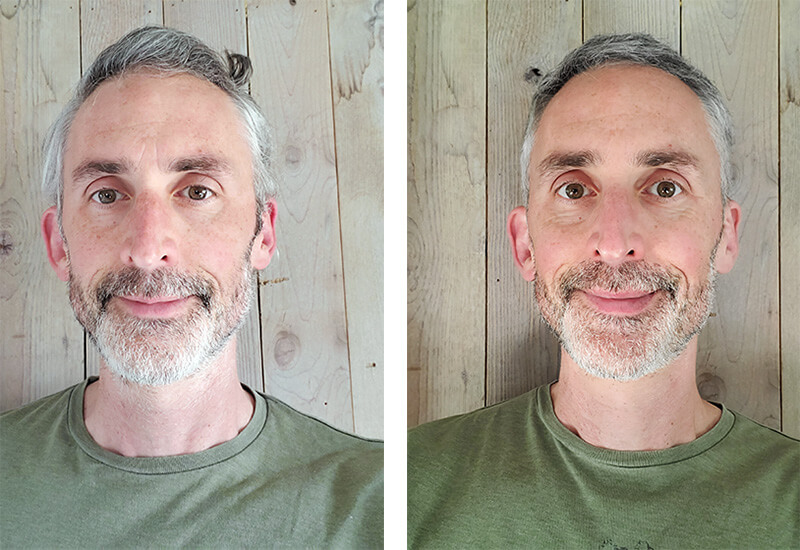
What happened to the no phone and stable sleep schedule?
At the end of the last article, I came up with some more plans to improve my sleep in addition to giving up caffeine. They were:
- Go for a 20 minute relaxing walk every day, even if I do other exercise that day.
- Turn the light off to go to sleep between 10:30 p.m. and 11 p.m. as often as possible.
- Set an alarm for 7 a.m. every morning.
- Don’t use my phone in bed. Books only.
I have to admit, I haven’t done so well on these points!
I have managed to go for a walk pretty much every day, so I can tick that one off the list.
My bedtime hasn’t been that stable though. It’s not helped by the fact that I don’t get home until after 10 p.m. on a couple of nights of the week at the moment, as I have some fun activities in my life right now. I could do better on the days that I am home though.
As for the phone, I’m getting there. Slowly. I’d say I turn it off before getting into bed on maybe two nights of the week on average, and only use it for 30 minutes on another two or three. But there are still nights when I get sucked into the screen for longer than I should.
So, I’m going to rethink the sleep schedule and see if I can find a compromise that works.
And here it is: my promise to myself for the next three months is that I will not use my phone in bed, but only read.
Wish me luck on that one; it could end up being the hardest challenge so far!
Your views
Have you tried giving up caffeine before? How did it affect your sleep and well-being? If you haven’t, but would like to, what is it that’s stopping you?
I’d love to hear your story in the comments below, or any thoughts you have about the experiment I’ve been doing with changing my lifestyle to change my sleep.
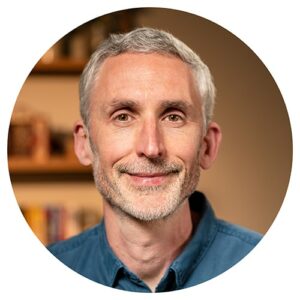
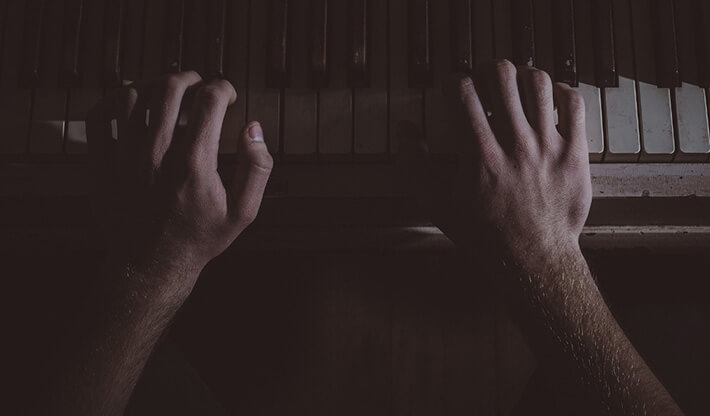
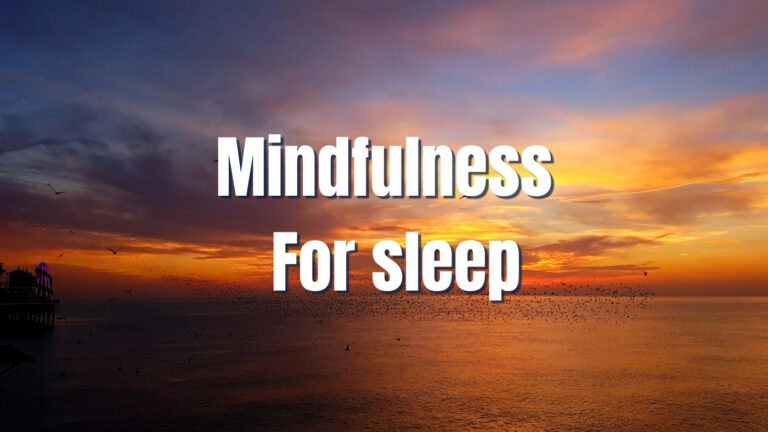
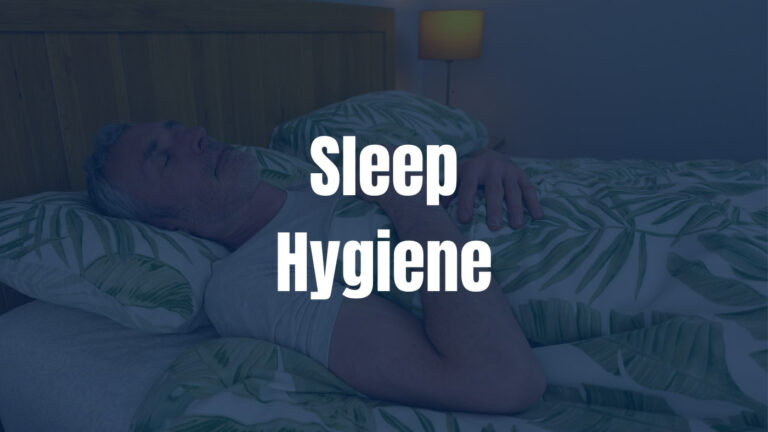
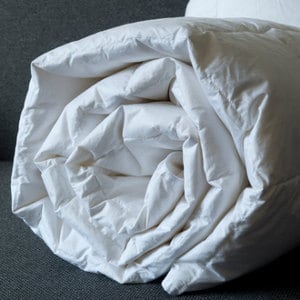
Hi, thank your for your story, it was very interesting and detailed.
I decided to fast from drinking coffee for 4 months before my trip to Europe in 2024. When i got to London i wanted to taste the cofee there, so i drank coffee for 2 weeks. 2 weeks later i came back home I continued to drink coffee. On October 15 2024 I missed the great feeling i had when i wasnt drinking coffee, getting deep sleep no need to run around like a chicken with his head off buying more coffee and tea and etc. No i havent drink coffe since October 15, 2024. I’m at the 4 mark again. And right now I dont intend to drink coffee on a daily basis as I had before ever again. The only time i plan to enjoy a cup of coffee is if I happen to go to an outing like breakfast with friends or family.
Hi Lucinda,
Thanks for your comment, and it’s nice to know you liked the article.
Funnily enough, my partner does something very similar to you. She stopped drinking coffee on a regular basis ages ago, but sometimes treats herself to one when she’s out. I have been thinking of doing the same, as it seems to work well for her.
Regards
Ethan
What an incredible experiment, thank you for sharing. I’m always interested in the aspect of quitting caffeine. Truthfully, I love the stuff. I quit for about 2 months back in 2021 to actually improve my insomnia, and while I didn’t have a sleep tracker, I can say I definitely felt more rested. But for me, the withdrawal effects lasted for weeks and were very profound. Early on, quitting caffeine seemed to actually cause more insomnia and anxiety. After several weeks, this finally calmed down, but I also had an ongoing sense of being out of balance. It was as if caffeine was regulating my equilibrium. And it felt like my neck was warm. Very weird. So, I decided to go back to drinking coffee, but not in the amounts I was previously drinking. I still deal with insomnia, and honestly, the only thing that helps is taking 3mg of melatonin. I honestly hate having to do this, but it’s the only thing that can keep me asleep for 7 hours; otherwise, I’m wide awake after about 4 or 5 hours. I do think that some people are able to function on less sleep and be fine. But there is not really a good way to tell if you’re one of those elite people.
Hi
Thanks for your comment, and I’m happy to hear you liked the experiment!
I agree that the withdrawal isn’t very pleasant and can last quite a while. I think moderating the caffeine after doing your own test is a good idea, and something I’ve been considering lately too.
All the best
Ethan
This is outstanding work. I applaud the effort! This is the single best piece on getting off caffeine I’ve ever read – and I’ve read a lot!
Our health journeys are eerily aligned. cool! I am just over 2 months off caffeine – I’m finding that I get to sleep MUCH easier, but wake up not feeling particularly well or rested. I’m hoping this improves as my brain continues to adjust.
Thanks for the tremendous effort. It’s appreciated more than you can know!
Hi Tim
Thanks so much for your positive words, I also really appreciate that!
Well done for getting off the caffeine. I hope your overall sleep quality does improve, but at least you’re falling asleep easier.
Regards
Ethan
I now read your responses to the comments about deep sleep and REM. I’m not suggesting you don’t look at total times. Let’s say the Fitbit consistently provides wrong calculations to the stages, you still will see a difference before and after cutting caffeine, because the system will continue to do whatever wrong calculation consistently. Fitbit has a better calculator than Apple, but I do hear your concern because the Oura ring just changed their formula messing up with their users. Great article! Thank you.
P.S by the way I suggested that because I was never a coffee drinker, I started during the pandemic and it totally messed up my deep sleep, not the other metrics, I thought the fitbit was wrong until I stopped drinking caffeine and both my body and the deep sleep metric improved.
Hi Caroline
Thanks for both your comments. You correctly identified that it’s my concerns around accuracy that led me not to focus too heavily on individual sleep stages. However, it’s certainly interesting what you noticed about your deep sleep changing when you started and then gave up coffee again.
You may have a good point about any inaccuracies staying the same, and I’ll definitely have a think about that if I do any more of these articles.
Regards
Ethan
Caffeine affects deep sleep specifically. I recommend you to check that data point instead of total score to see if there’s any change after quitting caffeine.
I gave up coffee two weeks ago. I never had any withdrawal symptoms, just a slight, very slight headache on the first day. However, what I am finding is that my sleep has become almost problematic. I fall asleep easily around 10 pm, but I used to wake up between 4 and 6 am. Now, I still wake up during that time, but I am able to fall back asleep. One day, I even slept until 10 am, and today I slept until 11:30 am. I’m starting to worry that something is wrong and that it can’t be solely attributed to giving up coffee.
Hi Randi
Thank you for sharing your experience with giving up coffee. It’s not uncommon to experience changes in sleep patterns when making significant changes to our routines, such as eliminating caffeine. While some may have improved sleep after quitting coffee, others may notice temporary disruptions. It’s important to give your body time to adjust and establish a new equilibrium. If your concerns persist or worsen, it might be helpful to consult a healthcare professional for further guidance. Keep up the positive changes though and hopefully you’ll get into the sleep pattern you’d like soon.
Regards
Ethan
Hi,
I’m currently at the end of week 1 being caffeine free. I spent about 3 weeks reducing my intake until I was down to just my morning coffee when I woke up. I gave that up a week ago and changed over to decaffeinated coffee. I know there’s still a tiny bit of caffeine in decaff, but I came to a realization that an average day for me consisted of about 12 cups of coffee which is way more than I should of ever been consuming, but prior to this week I’ve not spent a day caffeine free in at least 15 years. So I took the jump fully expecting to feel really rubbish but so far I’ve felt great, my sleep score doesn’t seem to of improved but I feel fresher in myself, and one key thing I’ve noticed is that now I wake up in the morning feeling fine whereas before i’d wake up and be rushing to the tap to get a drink of water. I still drink water every morning and all day of course but I’m not desperate for water as soon as I wake up anymore.
All in all its been great and initially, I started with a goal of 30 days caffeine-free and see if I want to reintroduce caffeine, but after 7 days I don’t foresee a situation where I will feel the need to reintroduce caffeine as a daily thing. I’ll allow myself the odd treat now and again with a oat milk vanilla latte as I really enjoy it, but that would be a somewhat rare treat if I go for a coffee with a friend.
I think I’ve waffled on plenty now so I won’t keep you any longer, thank you for this article, it made for some great reading.
Have an awesome day whatever you plan to do with your day.
Hi Aaron
Thanks for sharing your experience – it was also very interesting to read! I agree with pretty much everything you said, I think. It’s interesting how your sleep score didn’t change, but you felt better. This has been similar to my experience. Giving up things like caffeine, alcohol, and sugar seem to have benefits that are obvious to you yourself, but not necessarily reflected in the tools we have at hand to measure our lives.
Regards
Ethan
Firstly, great article!
I think the quality of your sleep would be a better metric of how your sleep changed off alcohol, caffeine, and sugar, than the amount of sleep that you got. I think the amount of REM and deep sleep could be a better indicator!
Hi Simon
Thanks, glad you liked the article. The problem with the quality of sleep measurement is that it’s very hard for me to have any kind of ‘feeling’ about the accuracy. I have no way of judging how accurate a sleep tracker’s sleep stage measurements are, and there has historically been a bit of controversy around their accuracy in general. At least with total sleep time, I know if it’s wildly inaccurate. If it says I slept for eight hours, but I know I was reading for an hour and only had my eyes closed for seven hours, then there is a problem. How much of that seven hours I was actually asleep for is another question, of course, but at least I have some tools for double checking. Having said that, I do sometimes include the sleep scores in my articles, which is essentially the sleep quality anyway.
Regards
Ethan
I have decided to cut out caffeine and alcohol for one month to see if it helps me sleep. (I drink one caffeine drink in the mornings and 2-3 alcoholic drinks a week). I stumbled on your article while Googling the subject. I found your experiments and insights very interesting! I’m so tired of being tired that I’m about ready to do anything that will help. I also wear a FitBit, but often feel it lies to me — it thinks I’m asleep when actually I’m not, I’m just lying there awake. I typically get on average 6.5 hours of sleep, but years of that (or less) is exhausting.
Hi L
Thanks for sharing your experience, and I’m pleased to hear the article was interesting.
Well done for deciding to cut out the alcohol and caffeiene for a month. I hope it does bring you some benefits. As time goes by, I’m more and more convinced that alcohol in particular was bad for my sleep. I’m still going strong, 21 months later, and no plans to go back to it.
Regards
Ethan
I am on the 6th week of zero caffeine. My sleep has been very irregular since I quit, but I am gradually falling asleep and staying asleep between 10pm-4am. I have found it really helpful to go to bed right around when I get tired which is between 9:30/10pm. The other noticeable change is, like you experienced, a reduction in anxiety. I feel so much more calm and level-headed throughout the day. I won’t be going back to caffeine primarily because I don’t want to be regularly on edge again.
Hi Courtney
Thanks for sharing your experience. It was interesting to read about your reduction in anxiety. I am absolutely certain now that it’s made a huge difference for me. As an experiment, a little while ago I spent a few weeks back drinking caffeine (I’ve gone back to zero now). I quickly started to notice anxiety about things that I didn’t have before, and was more sensitive to life’s daily problems and challenges. As you said, I feel much calmer and level-headed without any caffeine.
As for sleep, I also believe it’s better not to drink caffeine, at least for me. The number of nights with disrupted sleep seemed to increase when I was back drinking it, and importantly, I think my nighttime worries were more present, which also has an impact on my sleep.
So yes, as far as I’m concerned, caffeine is going to be a big no-no going forward again!
Regards
Ethan
Hey Ethan,
Thanks for all the work you’ve done in putting this whole article together! I love when people take the time to assess such things upon their own bodies, I find it fascinating.
I personally used to be extremely addicted to caffeine and would consume anywhere between 200mg – 450mg/day for about 3 years back-to-back.
In 2021, I decided that after quitting sugar for 90 days and seeing its results, it was time for me to try and quit caffeine. I am not a balance type of guy, so I went cold turkey. It was INSANELY hard.. for about 2.5 weeks I couldn’t recognise myself anymore:
– I was sleeping more and waking up relatively tired
– I wouldn’t be able to do any productive work after 5-6 pm most days
– I lost my drive and focus for at least 2.5 weeks if not more.
After month 1 however, things started to shift. I successfully did a full reset of 5 months, which might have been the biggest challenge I did up to date.
Now, about 14 months later, I find myself falling into old habits again where I tend to have a caffeinated beverage every day. It’s not a lot, but I decided to do a 30-day fast this time.
What I would suggest you though for improving sleep is to use a more accurate sleep tracker such as WHOOP or Oura ring. Fitbits are great for counting calories and for running, but they’re definitely not spectacular when it comes to keeping track of REM or deep sleep which is probably what you should be looking at in your analysis.
Again, super happy to have found this article! Do you have a newsletter by any chance?
Pascu
Hi Pascu
Thanks for sharing your experience – it was very interesting to read!
I can totally relate to the period of time you describe in which things didn’t seem quite right. I definitely went through a similar transition phase when I gave up sugar and alcohol, and also caffeiene. I think it takes time for the body to adapt, and it’s particularly pleasant until it does. But it’s well worth sticking it out though as the benefits, when they come, far outweigh the initial discomfort and loss of energy/motivation etc.
As for the sleep tracking, thanks for the suggestion. As a general rule of thumb, I try not to put too much stock in the sleep stage tracking. I’m just not convinced how accurate any of them really are, and can’t confirm it myself. At least with total sleep time, I am able to confirm more or less that I was likely to have been asleep when it said I was. For example, if it says I was asleep when I was just reading in bed quietly, I know there is a big problem. I can’t do that with REM and deep sleep though.
I don’t currently have a newsletter, but keep meaning to get one up and running again! Have you seen my youtube channel? I mostly publish reviews there, but at least you can keep an eye on what I’m up to.
Regards
Ethan
Thanks for your insightful, personal story. I was just looking online to see told other’s experiences. I’ve given up sugar for 1 month. It’s surprisingly easy to live without!!! I don’t drink or use caffeine. I may have a black tea, but I don’t feel the effects, and never have it daily. Anyhow, thanks again for sharing.
Hi Amanda
You’re welcome – I’m glad you liked the article. Well done on giving up sugar! It isn’t as hard as it might seem once you get used to it. I have to admit, I still get cravings for something sweet though, which is usually satisfied with some plain yoghurt, fruit, and crushed nuts. That seems to do the trick!
Regards
Ethan
Great post! Though I’ve never had the courage to quit caffeine completely, I’ve definitely learned about its effects on sleep. Best wishes!
Thanks Jim, I’m glad you liked the article. If you decide to give it up one day, I hope it goes well! I don’t think it takes much courage – just some acceptance that there will be a couple of days of discomfort potentially. And after that it’s much easier than you might imagine, in my experience.
Regards
Ethan